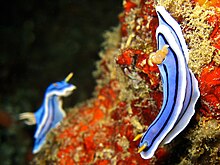Nudibranchia
| Nudibranch | |
|---|---|
 |
|
| Berghia coerulescens | |
 |
|
| A pair of Chromodoris lochi from Puerto Galera, the Philippines. | |
| Scientific classification | |
| Kingdom: | Animalia |
| Phylum: | Mollusca |
| Class: | Gastropoda |
| (unranked): |
clade Heterobranchia clade Euthyneura |
| Clades | |
| Diversity | |
| about 3000 species | |
clade Euthyneura
clade Nudipleura
clade Nudibranchia
Cuvier, 1817
Nudibranchs /ˈnjuːdᵻbræŋk/ are a group of soft-bodied, marine gastropod molluscs which shed their shells after their larval stage. They are noted for their often extraordinary colours and striking forms. Currently, about 2,300 valid species of nudibranchs are known.
The word "nudibranch" comes from the Latin nudus, naked, and the Greek βραγχια, brankhia, gills.
Nudibranchs are often casually called sea slugs, but many sea slugs belong to several taxonomic groups which are not closely related to nudibranchs. A number of these other sea slugs, such as the photosynthetic Sacoglossa and the colourful Aglajidae, are often confused with nudibranchs.
Nudibranchs occur in seas worldwide, including in the tropics and the Southern Ocean.
Nudibranchs live at virtually all depths of salt water, from the intertidal zone to depths well over 700 m (2,300 ft). The greatest diversity of nudibranchs is seen in warm, shallow reefs, although a new nudibranch species was discovered at a depth near 2,500 m (8,200 ft).
...
Wikipedia
